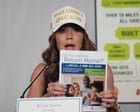
In recent news, we see communities rallied around justice and media integrity, highlighting the interconnectedness of our world. Two significant developments have brought attention to humanitarian efforts and issues of media transparency.
The first matter unfolds in the context of immigration policy and humanitarian protection. A federal judge has decisively stepped in to block an attempt to prematurely end Temporary Protected Status (TPS) for approximately 521,000 Haitian immigrants in the United States. This decision comes after moves by the Department of Homeland Security earlier in the year to rescind the extension granted by the previous administration. The extension aimed to ensure protections remained in place until February. Subsequent alterations had initially sought to conclude the program by August 3, eventually extending it yet again to September 2. However, this judicial intervention affirms the continuity of protections, maintaining security for many who rely on this status to remain in the country temporarily.
Temporary Protected Status is a critical aspect of U.S. immigration law, designed to offer individuals from countries experiencing devastating circumstances—such as armed conflicts or natural disasters—a safe haven. For many Haitian immigrants, TPS has been a vital lifeline following adverse conditions in Haiti. This legal ruling is a moment of reprieve, providing stability for those who face uncertainty due to the ongoing conditions in their homeland.
In a separate yet equally compelling development, the international media scene has been stirred by a call for transparency and accountability within one of the world’s leading news organizations. Over 400 media personalities, including notable figures like Miriam Margolyes, Alexei Sayle, and Mike Leigh, have united in urging the BBC board to address perceived conflicts of interest concerning Robbie Gibb, a board member. The call for Gibb’s removal comes amidst concerns regarding his connections with the Jewish Chronicle and its potential impact on the BBC’s coverage of sensitive topics, particularly relating to Middle East politics.
This movement is underpinned by a broader desire for transparent and unbiased reporting, especially concerning complex geopolitical issues such as the Israel-Palestine conflict. The letter from the signatories echoes a commitment to editorial independence and the integrity of information dissemination, highlighting concerns over potential censorship and lack of clarity in the editorial decision-making process.
Among the signatories, the involvement of over 100 BBC journalists emphasizes the internal acknowledgment of these challenges and the importance of addressing them. Media landscapes are continuously evolving, and calls for accountability reflect the demands of a discerning global audience that values authenticity and fairness in journalism.
These stories, while distinct in their contexts, each represent impulses toward fairness and benevolence within their respective arenas. The federal judge’s decision reinforces humanitarian principles by supporting vulnerable communities, while the media figures’ campaign advocates for integrity and transparency in journalism. Both issues reflect a shared human commitment to justice and truth, motivating positive progress in our societies.
Source: {link}
